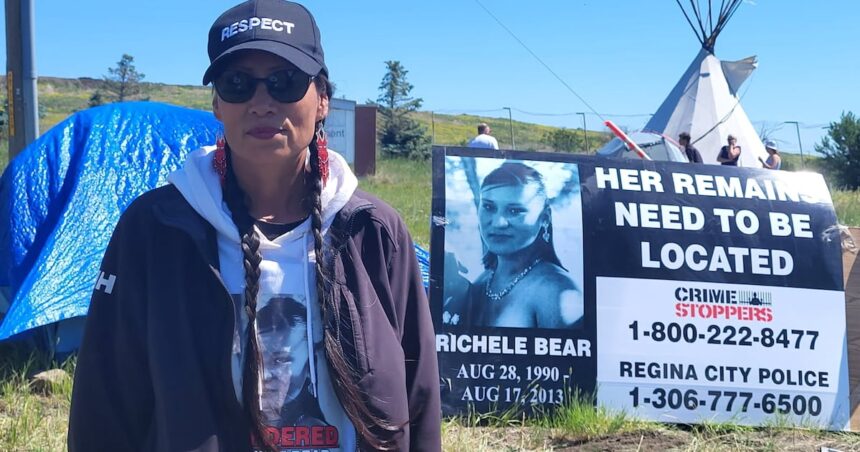I’m Sophie Tremblay, reporting from Regina, where the summer heat has intensified a mother’s desperate plea for justice. For 16 days now, Marlene Bird has maintained her hunger strike at the edge of the Regina landfill, subsisting only on water and traditional medicines. Her camp—four folding chairs, a small fire pit, and a weathered tent—has become the unlikely epicenter of a growing national movement.
“I’ll be here until I can’t carry on anymore,” Bird told me yesterday, her voice steady despite visible fatigue. “My daughter deserves to be found and brought home with dignity.”
Bird’s 22-year-old daughter, Sarah, disappeared last February after leaving a downtown Regina bar. Police investigations led to the city landfill following digital evidence and witness statements, but authorities halted the search after just six days, citing “prohibitive costs” and “low probability of success.”
The Regina Police Service statement, released three months ago, indicated that “exhaustive investigative measures” had been taken, but Bird disputes this characterization. “They gave up before they really tried,” she said, wrapped in a star blanket as temperatures dipped at dusk.
Bird’s protest has transformed from a solitary vigil into a gathering place for Indigenous leaders, community members, and allies. When I arrived on Tuesday, over fifty supporters formed a circle around her camp, many having traveled from First Nations communities across Saskatchewan and neighboring provinces.
Court documents I reviewed show the police obtained a search warrant for the landfill based on cell phone location data and surveillance footage tracking the primary suspect’s vehicle. According to Dr. Emily Wapahoo, forensic anthropologist at the University of Saskatchewan, the technical challenges, while significant, aren’t insurmountable.
“Landfill searches are complex but have succeeded elsewhere in Canada,” Wapahoo explained during our interview at her laboratory. “With proper resources and methodology, remains can be recovered even months after disposal.”
The Federation of Sovereign Indigenous Nations has formally petitioned the federal government to intervene. Chief Bobby Cameron pointed to similar cases in Winnipeg, where initial refusals to search landfills for Indigenous women’s remains sparked national protests in 2023.
“This is the continuation of a pattern,” Cameron said. “Indigenous lives are treated as disposable. The resources always seem unavailable when it’s our daughters and sisters.”
The Saskatchewan Ministry of Justice maintains that the decision falls under municipal and provincial police jurisdiction. Minister Robert Langley declined my interview request but provided a statement acknowledging “the family’s profound grief” while defending the “operational decisions made by law enforcement based on available evidence.”
Bird’s hunger strike comes amid troubling statistics. The National Inquiry into Missing and Murdered Indigenous Women and Girls found that Indigenous women and girls are 12 times more likely to be murdered or go missing than other women in Canada. In Saskatchewan specifically, Indigenous women represent over 55% of female homicide victims despite constituting only 16% of the female population.
Dr. Cindy Blackstock, Executive Director of the First Nations Child and Family Caring Society, visited Bird’s protest site last weekend. “What we’re witnessing is the physical embodiment of the report’s findings,” she told me. “Families are forced to literally put their bodies on the line to get basic investigative services that would be automatic in other communities.”
The hunger strike has catalyzed action from unexpected quarters. Three Regina city councillors have broken ranks with the mayor, proposing emergency funding for a preliminary search assessment. Councillor Debra Mack submitted the motion yesterday, stating, “This isn’t about politics; it’s about humanity.”
Meanwhile, a crowdfunding campaign initiated by local advocacy group Justice for Indigenous Women has raised over $280,000 toward a privately funded search. Campaign organizer Jennifer Standing says they’ve contacted forensic specialists from Ontario who conducted similar searches successfully.
The protest site has evolved into what Bird calls a “sacred space of resistance.” Traditional ceremonies occur daily, with elders leading prayers as supporters maintain a 24-hour presence. Yellow ribbons—hundreds of them—flutter from nearby trees, each bearing messages of support or names of missing Indigenous women.
Legal experts suggest the case highlights systemic issues in how missing persons investigations are prioritized. Catherine Latimer, Executive Director of the John Howard Society, pointed to discrepancies in resource allocation. “We see massive operations launched for some missing persons while others receive cursory attention,” she noted during our phone conversation. “The pattern of which cases get resources follows troubling social hierarchies.”
Bird’s health is increasingly concerning to those around her. Dr. Mark Robertson, who volunteers medical monitoring at the site, told me her blood pressure has dropped significantly. “She’s experiencing the expected effects of prolonged fasting, but refuses medical intervention,” he said. “Her determination is extraordinary, but the physical toll is mounting.”
As darkness fell on my second evening at the camp, Bird shared her daughter’s photograph—Sarah in graduation regalia, beaming beside her mother. “This isn’t just about my child,” she said. “This is about every Indigenous woman who disappears and is forgotten by the system that should protect her.”
Bird vows to continue her hunger strike until authorities commit to a thorough search. As national media attention intensifies and political pressure builds, her quiet determination has accomplished what months of formal requests could not: forcing Canada to confront difficult questions about whose lives merit exhaustive investigative efforts.
From the edge of the Regina landfill, this is Sophie Tremblay for Mediawall.news.






